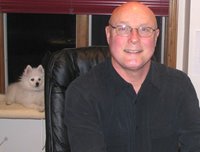"THE SPEECH"
This commentary was published in The Fargo Forum on March 30, 2008.
I see in Barack Obama the potential and possibility of transformative leadership. When I listen to Barack Obama speak, I feel hopeful. Maybe we can renew our nation. Perhaps we can recommit ourselves to the noble values and grand purpose of America. He reminds me of the best energy of the 60’s.
The Reverend Jeremiah Wright’s words upset me as they did so many others, but for reasons different than some. A mature person can separate the truth from hyperbole and can place words in local and historical context. While stunned by Wright’s vehemence, I did not judge him or Obama. We have free speech in this country, and I do not practice guilt by association—not for Obama, McCain, or Clinton. I formed my opinion of Obama by studying the man, his life, and his actions and by what I see in him with my own eyes.
I did, however, wonder if Wright’s anger and extreme words would destroy Obama’s bid for the presidency. Could Obama—still unknown to many—withstand the stereotyping that was sure to follow? Could he withstand the mindless projection of white fears of black men unto him?
I watched his speech on :"Race and Politics" (March 18, 2008) with concern.
What would Obama do? Would he be defensive? Would he blame others? Would he demonize and scapegoat Reverend Wright? Would he rebuke the media?
I held my breath as he spoke. I watched carefully. I saw something new and different. This man was real. He spoke from his heart. He told the truth and revealed himself to us. He respected us and talked to us as adults. He was responsible. He taught us.
He put the immediate political predicament into a larger, more encompassing and enduring context. He asked us to choose to be responsible and to engage in a deeper conversation. He called on us to be a better people: more aware, more understanding, more compassionate. I marveled at his insight, empathy, and authenticity. His stature grew before me; he dwarfed other candidates—past and present--in his spiritual essence.
This was a speech more important than a presidential campaign. The speech rose far above politics and how white working class men would react to the message as so many myopic pundits wondered. They assumed that the white working man is too dumb or too racist to understand what Obama called for. Are they?
Obama asked us to see the dark side of fear, anger, and race in American life, to surface the dark shadows, talk about them, and from the conversation forge a new vision for relationships in our lives. From new relationships we can join together to solve the problems our nation faces that have so far been unsolvable. This was a speech about healing and evolving to a higher level of humanity--Obama called us to greater maturity.
As I listened to him speak, I relaxed. I was not wrong. Obama is for real—a good person and a true visionary leader. My question shifted from “Is he up to the challenge” to “Are we up to the challenge he gave us?”
Not all responded favorably to Obama’s speech—mostly those on the far right of American politics. As you listen to them, consider these questions: Why are they so angry? What do they fear? Why are their hearts so closed? Do they benefit from hatred, racism, and division? Do they apply the same standards to themselves and their candidates that they apply to Obama? Think about their assertions and ponder their motivations.
Ignorance is a choice. We need to think, think, think, about Obama’s message, how it applies to each of us, and ask what we can do to contribute to the conversation. What efforts can we make today in our own lives?
Obama’s success in the presidential campaign will depend not on him, but on us. Are we ready to seize the moment and the opportunity of Barack Obama? Can we grow along with him as he calls upon our higher needs? Do we really want the change we say we do? Are we ready for more challenges to evolve ourselves sure to come from this transformational leader? Or will fear paralyze us and foreshadow more of the same politics? How sad it would be for us to miss this opportunity for leadership in America.
Barack Obama is ready to be our president. Are we ready for a president as gifted as he?

